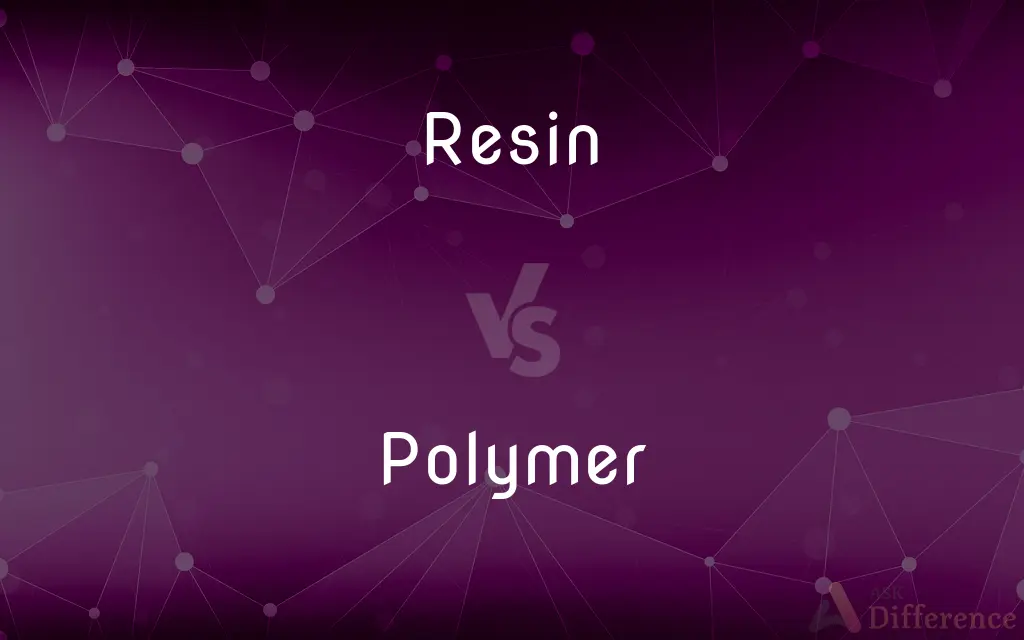Resin vs. Polymer — What's the Difference?
By Tayyaba Rehman — Updated on November 2, 2023
Resin is a viscous substance of plant or synthetic origin that hardens on curing, while a polymer is a chemical compound formed by long chains of repeating molecular units.

Difference Between Resin and Polymer
Table of Contents
ADVERTISEMENT
Key Differences
Resins are usually viscous substances derived from plant secretions or synthetic equivalents, used for adhesives or coatings. Polymers, on the other hand, encompass a wider range of natural or synthetic materials with high molecular mass, including plastics, DNA, and proteins. Both resins and polymers consist of molecules bonded together, but the term "polymer" is more general.
In the context of chemistry, resins can be polymers but not all polymers are resins. For example, natural resins like pine sap are polymers composed of terpenes, whereas polymers can be vast and varied including nylon, a synthetic polymer not considered a resin. Both terms describe materials with large molecules but their source and application can differ significantly.
Resins often refer to components in varnishes, glues, and composite materials like fiberglass, being either natural or synthetic in origin. Polymers are essential for the production of various materials, including resins, and they form the structural basis of many natural and synthetic materials, including plastic, rubber, and cellulose. Both resins and polymers are crucial in manufacturing a plethora of everyday items.
When discussing industrial applications, resins are utilized for their ability to cure and form solid materials, commonly used in the production of plastics through polymerization. Polymers themselves, such as polyethylene and polystyrene, are used in a myriad of applications, from packaging to clothing. The industrial usage of both highlights their importance in modern manufacturing processes.
In art and jewelry, resin typically refers to a clear synthetic polymer used for casting and coatings, showcasing how specific types of polymers can be referred to as resins. The field of materials science often distinguishes between the two by referring to polymers as the broader category of materials that exhibit a range of physical properties, whereas resins have a more specific usage and property set. Thus, while all resins are polymers, not all polymers share the characteristics or functions of resins.
ADVERTISEMENT
Comparison Chart
Source
Plant-based or synthetic
Broad range including natural (like DNA) and synthetic (like plastic)
State/Form
Typically viscous liquids that harden
Can be solids, liquids, or gels
Usage
Adhesives, coatings, and casting
Extensive: from textiles to technologies
Chemical Structure
Often complex mixtures with specific formulas
Long chains of repeating units (monomers)
Examples
Pine sap, epoxy, acrylic
Nylon, polyethylene, rubber, proteins
Compare with Definitions
Resin
A sticky substance exuded by some trees.
The bench was covered in pine resin.
Polymer
A substance with a molecular structure consisting chiefly or entirely of a large number of similar units bonded together.
The polymer chain was composed of hundreds of linked monomers.
Resin
A substance used as glue or as a binder in varnish.
I need a strong resin to fix this broken vase.
Polymer
Naturally occurring long chain molecules, such as DNA or proteins.
DNA is a naturally occurring polymer essential to genetic coding.
Resin
A solid or liquid synthetic organic polymer used as the basis of plastics, adhesives, varnishes, or other products.
She used a clear resin for the jewelry.
Polymer
Materials used in the creation of plastics and resins.
We studied the properties of the polymer used to make our drink bottles.
Resin
A medium used in art to encapsulate objects or for glossy finishes.
He poured resin over the painting to seal it.
Polymer
Fibers or materials made from long-chain synthetic polymers.
The jacket is made from a waterproof polymer fabric.
Resin
In polymer chemistry and materials science, resin is a solid or highly viscous substance of plant or synthetic origin that is typically convertible into polymers. Resins are usually mixtures of organic compounds.
Polymer
A synthetic material used in the manufacture of various products.
The company uses a special polymer to make its high-strength gears.
Resin
A sticky flammable organic substance, insoluble in water, exuded by some trees and other plants (notably fir and pine)
Clear resin had oozed to the surface, trickled down, and set
Polymer
A polymer (; Greek poly-, "many" + -mer, "part") is a substance or material consisting of very large molecules, or macromolecules, composed of many repeating subunits. Due to their broad spectrum of properties, both synthetic and natural polymers play essential and ubiquitous roles in everyday life.
Resin
A solid or liquid synthetic organic polymer used as the basis of plastics, adhesives, varnishes, or other products
Epoxy resins frequently cause dermatitis
The chassis is constructed of synthetic resin
Polymer
Any of numerous natural and synthetic compounds of usually high molecular weight consisting of up to millions of repeated linked units, each a relatively light and simple molecule.
Resin
Rub or treat with resin
Resined canvas
Polymer
(organic chemistry) A long or larger molecule consisting of a chain or network of many repeating units, formed by chemically bonding together many identical or similar small molecules called monomers. A polymer is formed by polymerization, the joining of many monomer molecules.
Resin
Any of numerous clear to translucent yellow or brown, solid or semisolid, viscous substances of plant origin, such as copal, rosin, and amber, used principally in lacquers, varnishes, inks, adhesives, plastics, and pharmaceuticals. Resins are usually insoluble in water.
Polymer
A material consisting of such polymer molecules.
Resin
Any of numerous physically similar polymerized synthetics or chemically modified natural resins including thermoplastic materials such as polyvinyl, polystyrene, and polyethylene and thermosetting materials such as polyesters, epoxies, and silicones that are used with fillers, stabilizers, pigments, and other components to form plastics.
Polymer
Any one of two or more substances related to each other by polymerism; specifically, a substance produced from another substance by chemical polymerization.
Resin
To treat or rub with resin.
Polymer
A naturally occurring or synthetic compound consisting of large molecules made up of a linked series of repeated simple monomers
Resin
A viscous hydrocarbon secretion of many plants, particularly coniferous trees.
Resin
Any of various yellowish viscous liquids or soft solids of plant origin; used in lacquers, varnishes and many other applications; chemically they are mostly hydrocarbons, often polycyclic.
Resin
Any synthetic compound of similar properties.
Resin
(transitive) To apply resin to.
Resin
Any one of a class of yellowish brown solid inflammable substances, of vegetable origin, which are nonconductors of electricity, have a vitreous fracture, and are soluble in ether, alcohol, and essential oils, but not in water; specif., pine resin (see Rosin).
Resin
Any of various polymeric substance resembling the natural resins[1], prepared synthetically; - they are used, especially in particulate form, in research and industry for their property of specifically absorbing or adsorbing substances of particular types; they are especially useful in separation processes such as chromatography; as, an ion-exchange resin.
Resin
Any of a class of solid or semisolid viscous substances obtained either as exudations from certain plants or prepared by polymerization of simple molecules
Resin
A compound mixed into composites for enhanced strength.
The resin in the composite material helps it resist impact.
Common Curiosities
What is a polymer?
A polymer is a large molecule composed of repeated subunits, which can be naturally occurring like DNA, or synthetic like plastic.
Can polymers be natural?
Yes, polymers can be natural, like cellulose in plants or DNA in cells.
What is resin?
Resin is a sticky substance derived from plants or created synthetically, used in products like varnishes, adhesives, and plastics.
How are resins made?
Natural resins are secreted by plants, while synthetic resins are created through chemical reactions, often involving polymerization.
Is plastic a resin?
Plastic is often derived from synthetic resins and is a type of polymer.
What are the properties of polymers?
Polymers have diverse properties, but generally, they are durable, malleable, and can be both thermal and electrical insulators.
Are all resins polymers?
Yes, all resins are a type of polymer, typically complex with specific uses.
Can resins be used in construction?
Yes, resins are used in construction as adhesives, sealants, and components of composite building materials.
Do resins only come from plants?
No, resins can also be synthetically produced, resembling natural resins in properties.
Are synthetic polymers environmentally friendly?
Many synthetic polymers are not biodegradable, raising environmental concerns, though some biodegradable options are being developed.
What role do polymers play in medicine?
Polymers are used in medicine for drug delivery systems, implants, and as components of medical devices.
How are resins used in art?
Resins are used in art for casting, coatings, and as a medium for encapsulating objects.
What is the difference between thermoplastic and thermosetting polymers?
Thermoplastics can be melted and reshaped, whereas thermosetting polymers cannot be remelted after they are set.
How are polymers recycled?
Polymers, especially plastics, can be recycled by melting, remolding, or chemically breaking down the material into its monomers.
Why are polymers important?
Polymers are vital in modern society for creating a wide range of products, from everyday household items to advanced technologies.
Share Your Discovery

Previous Comparison
Head vs. Mind
Next Comparison
Pity vs. SadAuthor Spotlight
Written by
Tayyaba RehmanTayyaba Rehman is a distinguished writer, currently serving as a primary contributor to askdifference.com. As a researcher in semantics and etymology, Tayyaba's passion for the complexity of languages and their distinctions has found a perfect home on the platform. Tayyaba delves into the intricacies of language, distinguishing between commonly confused words and phrases, thereby providing clarity for readers worldwide.
















































